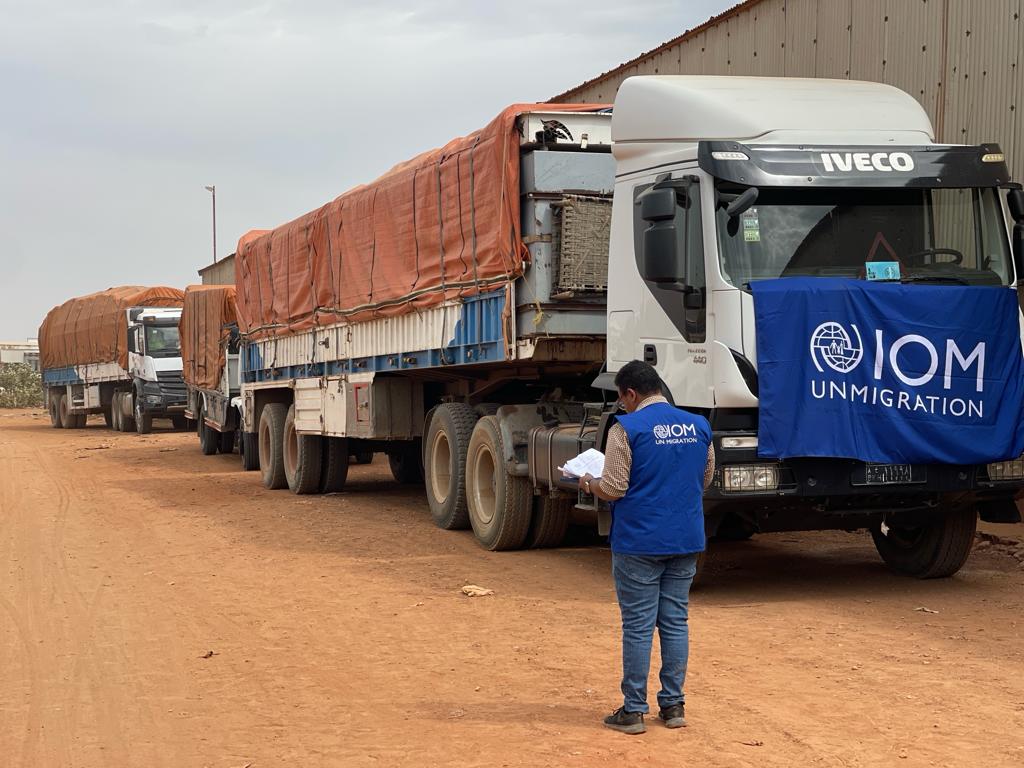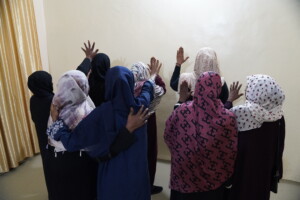Sudan war: RSF strike ‘security deal’ in El Gezira as CSOs condemn crimes

Lorries of the UN International Organization for Migration (IOM) carrying humanitarian aid with support of USAID arrived in Wad Madani on November 8, to reach over 21,000 people displaced by the Sudan crisis (Photo: IOM)
The Sons of Wad Madani Committee said they agreed with officials from the Rapid Support Forces (RSF) to reopen various facilities and health services in El Gezira and its capital, Wad Madani, to address the needs of residents. Civil society organisations persist in reporting violations in RSF-controlled El Gezira that are “tantamount to war crimes”.
Asim Mahjoub, spokesperson for the Sons of Wad Madani Committee for Services and Community Protection, told Radio Dabanga that the two parties agreed to divide Wad Madani into four units “to jointly coordinate on restoring security and stopping widespread plundering in all neighbourhoods”.
Mahjoub said that the committee’s meeting with the RSF also resulted in an agreement to “open and secure all kidney, heart, and children’s hospitals, and grocery stores as soon as possible in order to provide basic needs, especially for villagers who suffer from a scarcity of food supplies and illnesses”.
He announced an expanded meeting for more coordination at the level of the Greater Wad Madani locality to “spread this initiative among the villages of El Gezira”.
Two weeks ago, the RSF announced full control of El Gezira, after the Sudan Armed Forces (SAF) withdrew its troops from the 1st Infantry Division in Wad Madani a day earlier.
Journalists Syndicate
In a statement issued yesterday, the Sudanese Journalists Syndicate (SJS) condemned the ongoing crimes committed by the RSF, accusing them of “consistently targeting defenceless people and terrorising civilians”. The RSF, allegedly along with allied militias, have reportedly continued a series of “egregious human rights violations” in the villages and surroundings of El Gezira.
The SJS, citing press reports and witness testimonies, asserted that the “invasion of tEl Gezira and its capital, Wad Madani”, resulted in large-scale killings, looting, and forced disappearances. Crimes against women and children were specifically highlighted. The syndicate deems these actions as “tantamount to war crimes”.
The statement further confirmed that, “in blatant disregard for local laws and international humanitarian standards, reliable media reports and survivor accounts depicted additional intimidation tactics. This includes restricting the freedom of movement for civilians, preventing them from leaving danger areas, and employing civilians as human shields”.
The syndicate strongly denounced these practices, expressing concern about the safety of its members in El Gezira. Members were said to have sought refuge in remote areas, “with updated reports indicating the militiamen expanding towards their new havens”.
Addressing people stranded in conflict-stricken areas, the SJS called on “those wielding weapons to fulfil their responsibilities in protecting journalists, humanitarian workers, and emergency personnel”. Additionally, the group urged the establishment of safe paths for colleagues trapped in the eastern region of the island, emphasising the need for control mechanisms to curb the actions of force personnel, calling on international organisations such as the United Nation to intervene.
Resistance committees
For their part, the Wad Madani Resistance Committees condemned the continuing deterioration of the security, health and humanitarian conditions in El Gezira, continued attacks by the RSF, the withdrawal of hospitals from service, and the continuing waves of displacement in villages.
The committees said in their daily briefing on social media that the major hospitals in the state “were out of service after they were stormed by the RSF militia, leading to a scarcity and shortage of life-saving medicines”. El Gezira is reportedly witnessing a complete power outage.
On the humanitarian side, the committees said that multiple villages in El Gezira are “witnessing displacement daily, after the RSF seized their homes, and is continuing to loot, abuse, destroy, and terrorise El Gezira residents”.
The resistance committees of El Hasaheisa in El Gezira estimated that about at 1,800 cars and motorcycles have been stolen from the town by the RSF.
In a preliminary report on Monday, the committees said that paramilitaries “plundered all the agricultural tractors from the tractor exhibition near a factory in El Sadaga”. “The RSF then transported more than 80 stolen vehicles that were shipped on the back of the stolen tractors to Khartoum. In total, more than 250 commercial stores in El Hasaheisa market were looted by thieves and gangs.” The RSF also pillaged flour, rice, oil, and other factories, as per the report.
Radio Dabanga reported earlier that goods destined for Wad Madani were likely not to reach the town. Traders stated that large quantities of items stolen from El Gezira, which has been under RSF control since December 19, were on sale in Khartoum markets.
Sugar factories
The general manager of the Sudanese Sugar Company, Jadelrab Khalid, announced that El Junaid and Sennar sugar factories, and the Sugar Cane Research Centre in El Gezira, have been “completely ransacked” by the RSF.
In a statement yesterday, Khalid said that “all factory vehicles, numbering more than 300, were stolen. In addition, more than 450 heavy machinery, tractors, dumpers, and trucks, were taken, as well as fuel depots, oil and grease, tires, batteries, and all our fertiliser and pesticide stock”.
Khalid added that “sugarcane farms were targeted by gunmen, who set fire to the fields”.
Khartoum
Khartoum is reportedly experiencing a significant shift in its economic landscape following the fall of El Gezira to the RSF. Residents in the capital expressed relief as markets were flooded with essential items, and witnessed a noteworthy decline in prices.
In recent weeks, Khartoum faced soaring prices of daily consumer goods. The cost of a 50-kilo bag of sugar had surged to SDG120,000, while the price per kilo reached SDG3,000 in stores. Red meat prices also saw slight increases, with lamb reaching SDG13,000 per kilo. Vegetables and fruits experienced disproportionate price hikes, with potatoes and tomatoes exceeding SDG 3,000 per kilo.
Prices of essential goods such as a 50-kg bag of sugar plummeted to SDG30,000. The flow of stolen relief materials, including sugar, flour, dried milk, and cooking oils, also contributed to lower prices in the market.
Merchants attributed these increases to scarcity, limited imports from other states, reduced merchant activities due to expanded armed presence along highways, and increased transportation costs.
The transportation sector also experienced changes, with an increase in the number of displaced families returning to Khartoum. “This resulted in a smooth flow of service in transportation movements, particularly on Siteen Street in Khartoum”, which remained one of the most prominent roads linking transportation routes in Khartoum after traffic stopped on all other lines, a source said.
Fare prices continue to vary, as some long-distance lines witnessed an increase in prices, such as the fare for the Haj Yousef central line in Khartoum North, which reached SDG2,000. Fares for buses coming to Khartoum witnessed a 50 per cent increase, which bus owners attributed to a rise in fuel prices.











 and then
and then